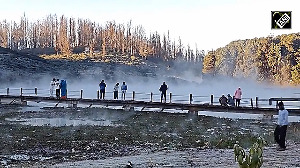During the trip, check your bank account and credit card statements regularly for unauthorised transactions.

This summer, thousands of travellers will do their travel, hotel and other bookings online.
A recent survey by online security provider McAfee warns that they need to be highly vigilant when carrying out these bookings.
McAfee's Safer Holidays Travel Report, based on a survey of 7,000 people across seven countries (1,010 in India), found that 51 per cent of Indian adults surveyed have fallen victim to an online scam while doing travel-related booking.
And, 77 per cent of those who had money stolen from them lost up to $1000 (around Rs 82,000) even before the trip began.
Risky behaviour
High inflation in recent times has made travellers keen to save money and led some to indulge in imprudent behaviour.
According to the McAfee survey, 54 per cent of the respondents were likely to seek bargain deals online, 50 per cent would quickly snap up such a deal, 44 per cent would be ready to try a new booking site, and 47 per cent would be willing to try a new destination.
Cyber criminals deploy phishing emails and fake Web sites that can lead to malware infection.
The McAfee report suggests that travellers should avoid emails offering mouth-watering deals that ask them to click on a link.
Instead, they should themselves go to the Web site of a reputable company and book.
While booking tickets, use only trusted online travel aggregators and agencies.
Says Harsh Walia, partner, Khaitan & Company: "Ensure the legitimacy of the listings, websites, services, etc. before making any payment." Double check the website's link.
"Phishers often modify spellings minutely so that one tends to miss the change," says Daniel D'Souza, president & country head-holidays, SOTC Travel.
He recommends checking the company's social media pages and reviews to ensure you are transacting with a credible entity.
Avoid getting lured by enormous discounts. Says Swapnil Bhaskar, head of strategy, Niyo: "Avoid all offers that appear too good to be true."
If the Web site is new, check for fraud.
"Type the company's name in Google Search and type the word 'fraud' against it. This will throw up any complaints that may exist against the company," says Prashant Mali, advocate, and expert on cybercrime and data protection.
Make payments only on secure Web sites. "The address should begin with 'https'. A padlock symbol should appear in the address bar," says Mali. The symbol indicates that data entered on the Web site gets encrypted before being transferred.
Look for popular payment options. "If options like Visa, MasterCard, American Express, Discover, etc are available, it is likely that some kind of due diligence would have been done by the network providers," says Bhaskar.
Beware of fake vacation rentals
Scammers often post fake vacation rentals, sometimes even on well-known platforms.
"They request payment upfront for the booking. When the traveller lands at the location, he discovers the rental is not available," says Mali.
The McAfee report suggests checking the name of the property owner in public records. It also warns against paying for rentals by wire transfer, prepaid cards, or gift cards, as these transactions often can't be reversed.
Stay vigilant during the trip
Many travellers use public Wi-Fi to conduct sensitive transactions.
"When you use a free Wi-Fi network at a public place, any sensitive information you transfer could be intercepted and misused," says Mali.
Only connect with Wi-Fi networks from a trusted source or use a virtual private network (VPN).
Devices should be secured with strong passwords and biometric authentication. Software and anti-virus applications should be kept updated to prevent malware infection.
Holistic security solutions are available nowadays that can identify malicious websites, provide VPN, etc.
Walia suggests that before setting out on a trip, travellers should set transaction limits for digital payments, merchant transactions, and foreign transactions in their bank accounts.
During the trip, check your bank account and credit card statements regularly for unauthorised transactions.
Finally, stay updated about common online scams so that you don't fall prey to them.

Source: Niyo
Feature Presentation: Ashish Narsale/Rediff.com












 © 2025 Rediff.com -
© 2025 Rediff.com -